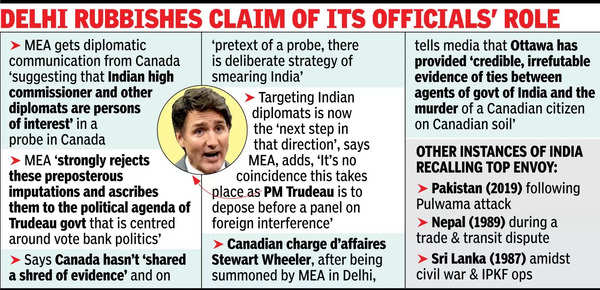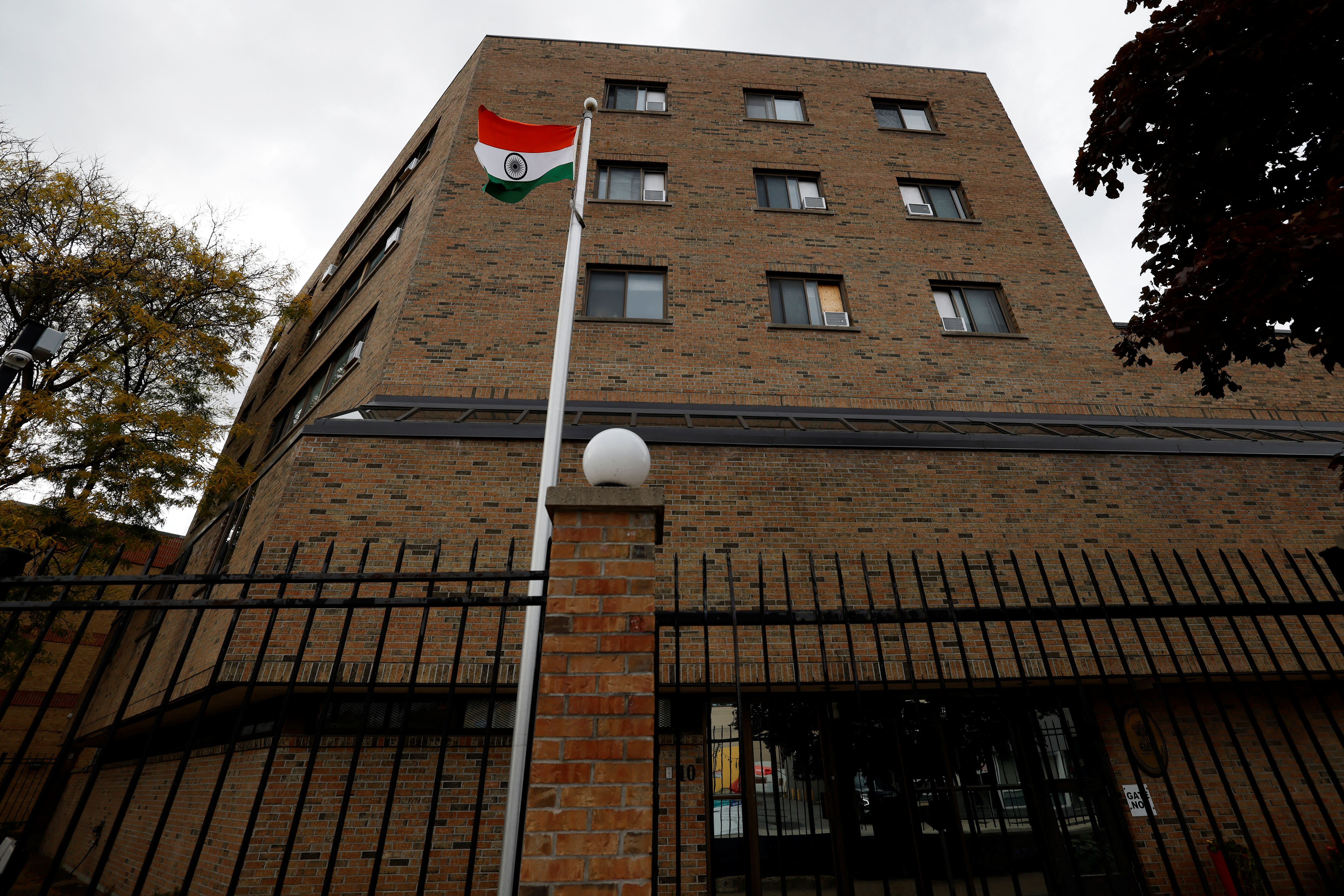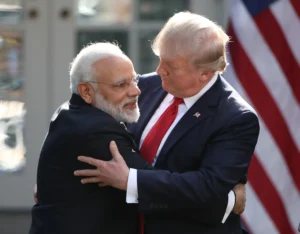
Canadian Prime Minister Justin Trudeau speaks at a news conference on the investigative efforts related to violent criminal activity occurring in Canada with connections to India, on Parliament Hill in Ottawa, Ontario, on Monday, Oct. 14, 2024. (Justin Tang/The Canadian Press via AP)
“Allegations Unraveled: Canada Accuses India of Targeting Sikh Separatists”

The diplomatic relationship between Canada and India has sharply deteriorated following the recent expulsion of diplomats from both nations, linked to the murder of Sikh activist Hardeep Singh Nijjar. This escalation marks a significant moment in an ongoing conflict that has seen both countries exchanging serious allegations.
Background of the Conflict
Hardeep Singh Nijjar, a prominent Sikh separatist leader advocating for an independent Sikh state, was shot dead outside a Sikh temple in Surrey, British Columbia, on June 18, 2023.
His assassination led to widespread protests within the Sikh community in Canada and raised concerns about foreign interference in domestic affairs. In September 2023, Canadian Prime Minister Justin Trudeau publicly accused Indian agents of being involved in Nijjar’s killing, a claim that India vehemently denied as “absurd” and politically motivated.
Recent Developments
On October 14, 2024, Canada expelled six Indian diplomats, including High Commissioner Sanjay Kumar Verma, designating them as “persons of interest” in the investigation into Nijjar’s murder. Canadian authorities have indicated that they possess substantial evidence suggesting a broader campaign orchestrated by Indian agents against Canadian citizens, particularly those linked to the pro-Khalistan movement.
Prime Minister Trudeau emphasized that Canada would not tolerate any foreign government threatening its citizens on Canadian soil.In retaliation, India expelled six Canadian diplomats and withdrew its own envoy from Canada. The Indian Foreign Ministry characterized Canada’s actions as “preposterous,” asserting that they were part of Trudeau’s political agenda amid domestic challenges.
Key Statements
- Justin Trudeau: “We will never accept the involvement of a foreign government in threatening or taking the lives of Canadians on our soil.”
- Indian Foreign Ministry: “India reserves the right to take further actions in response to the Trudeau government’s endorsement of extremism, violence, and separatism against India.”
Implications for Bilateral Relations
This diplomatic rift has significant implications for Canada-India relations, which were already strained due to differing views on Sikh activism and terrorism. The Royal Canadian Mounted Police (RCMP) has warned of potential public safety threats linked to activities by Indian agents within Canada. Reports indicate that there have been numerous credible threats against individuals associated with the pro-Khalistan movement.
What evidence did Canada present to link the Indian diplomats to the murder

Canada has recently intensified its allegations against India regarding the murder of Sikh activist Hardeep Singh Nijjar, leading to the expulsion of several Indian diplomats. Prime Minister Justin Trudeau and Canadian officials have presented several key pieces of evidence linking Indian diplomats to this assassination.
Key Evidence Presented by Canada
- Status as Persons of Interest: The Canadian government has identified the Indian High Commissioner and five other diplomats as “persons of interest” in the investigation into Nijjar’s murder. This designation implies that they are believed to have relevant information or involvement in the case.
- Intelligence Gathering and Criminal Activities: Trudeau stated that these diplomats were involved in gathering intelligence on Canadian citizens, particularly those associated with the Sikh community, and relaying this information to organized crime for potential attacks. This suggests a broader campaign targeting individuals perceived as threats by the Indian government.
- Royal Canadian Mounted Police (RCMP) Findings: The RCMP has reportedly compiled “ample, clear, and concrete evidence” indicating that agents of the Indian government were involved in orchestrating violent incidents within Canada, including Nijjar’s assassination. They have linked these agents to various criminal activities, raising concerns about public safety for Canadians and residents of South Asian descent.
- Increased Threats: Following last year’s allegations regarding Indian involvement in Nijjar’s death, there has been a noted increase in credible threats against individuals associated with the pro-Khalistan movement in Canada. The RCMP has warned of more than a dozen imminent threats against such individuals, further substantiating claims of targeted violence by Indian agents.
- Previous Allegations: Trudeau referenced credible allegations made earlier that suggested connections between Indian government agents and Nijjar’s assassination. This historical context adds weight to the current claims being made by Canadian authorities.
India’s Response
In response to these allegations, India has categorically denied any involvement in Nijjar’s murder, labeling Canada’s claims as “absurd” and politically motivated. India’s Ministry of External Affairs has expressed skepticism regarding Canada’s ability to ensure the safety of its diplomats and has expelled six Canadian diplomats in retaliation.The diplomatic fallout from these events underscores a significant escalation in tensions between Canada and India, with both nations taking firm stances on their respective allegations and actions.
What specific evidence did the RCMP uncover
The Royal Canadian Mounted Police (RCMP) has uncovered significant evidence linking Indian diplomats to serious criminal activities in Canada, particularly concerning the murder of Sikh activist Hardeep Singh Nijjar. Here are the specific findings reported:
Key Evidence Uncovered by the RCMP
- Information Gathering: The RCMP alleges that Indian diplomats and consular officials engaged in clandestine activities to collect intelligence on members of the South Asian community in Canada, especially those associated with the pro-Khalistan movement. This information was reportedly used to target these individuals, including coercive actions against them.
- Direct Links to Violent Crimes: Investigations revealed connections between Indian agents and violent crimes, including homicides and extortion. The RCMP highlighted that these agents were involved in orchestrating threats that posed a significant public safety risk.
- Collaboration with Organized Crime: The RCMP has indicated that Indian government agents collaborated with organized crime groups, specifically the Lawrence Bishnoi gang, to execute violent acts and create an atmosphere of fear within the South Asian community in Canada. This collaboration allegedly involved using criminal elements to further their objectives.
- Coercion of Local Individuals: Evidence suggests that some Canadian businesses and individuals were coerced or threatened into providing information to Indian agents. This indicates a broader campaign of intimidation aimed at suppressing dissent within the community.
- Multiple Threats Identified: The RCMP reported over a dozen credible threats against individuals linked to the pro-Khalistan movement, underscoring the ongoing risks posed by these activities. They have urged victims of such coercion to come forward and report incidents involving Indian agents.
- Interception of Communications: There are claims that intercepted communications have provided insights into the operations of Indian diplomats in Canada, revealing their involvement in activities that threaten public safety.

Conclusion
The recent developments surrounding the murder of Hardeep Singh Nijjar have escalated tensions between Canada and India, marking a significant turning point in their diplomatic relations. The evidence presented by the Royal Canadian Mounted Police (RCMP) suggests a troubling pattern of foreign interference and targeted violence against Canadian citizens, particularly within the Sikh community.As both nations stand firm in their positions—Canada asserting its commitment to protecting its citizens and India denying any involvement—the situation raises critical questions about sovereignty, security, and the implications of international diplomacy. The expulsion of diplomats from both countries underscores the gravity of the allegations and the potential for further fallout.Moving forward, it will be essential for both governments to navigate this complex landscape carefully. Continued dialogue and transparency will be crucial in addressing the underlying issues while ensuring that the safety and rights of individuals are upheld. The international community watches closely as this situation unfolds, highlighting the delicate balance between national interests and global diplomatic relations.
Discover more from
Subscribe to get the latest posts sent to your email.







